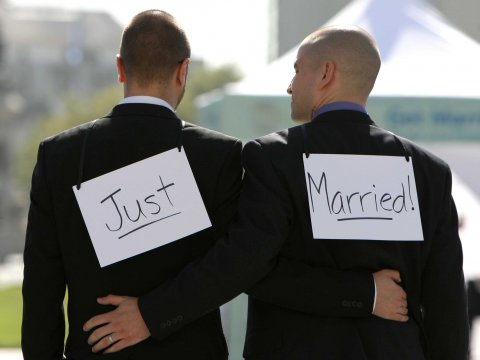Congratulations on your journey to building a strong and loving relationship! For members of the LGBT community, premarital counseling can be a valuable resource in navigating the challenges and unique dynamics that arise within same-sex partnerships. In this article, we will explore the significance of LGBT premarital counseling, its benefits, how to find counseling services, and what to expect from the counseling process.
Contents
- 1 Understanding LGBT Premarital Counseling
- 2 Benefits of LGBT Premarital Counseling
- 3 Creating a Safe Space for LGBT Couples
- 4 Addressing Unique Challenges in LGBT Relationships
- 5 Finding LGBT Premarital Counseling Services
- 6 Choosing the Right LGBT Premarital Counselor\
- 7 What to Expect in LGBT Premarital Counseling
- 8 Conclusion
Understanding LGBT Premarital Counseling

LGBT premarital counseling, also known as pre-commitment or prenuptial counseling, is a form of therapy that aims to help same-sex or gender-diverse couples prepare for a committed relationship or marriage. It provides a safe and supportive environment for couples to explore their individual identities, relationship dynamics, and potential challenges they may face as a same-sex or gender-diverse couple.
Here are some key aspects to understand about LGBT premarital counseling:
- Relationship Assessment: Counseling typically begins with an assessment of the couple’s relationship strengths and areas of growth. The therapist may use various tools and techniques to gain insights into the couple’s communication styles, conflict resolution skills, shared values, and expectations.
- Identity Exploration: For many LGBT couples, navigating their sexual orientation, gender identity, or expression can be an important aspect of their relationship. Premarital counseling may involve discussions about individual and shared identities, coming out experiences, and understanding how these aspects impact the relationship dynamics.
- Communication and Conflict Resolution: Effective communication is vital in any relationship. The counselor helps the couple develop healthy communication skills and guides resolving conflicts constructively. This can include techniques such as active listening, expressing needs and concerns, and finding compromise.
- Family and Social Support: LGBT couples may face unique challenges related to family acceptance, societal attitudes, and discrimination. Premarital counseling may address how these factors could impact the relationship and help the couple develop strategies to navigate them together. This can include discussions about coming out to family and friends, managing social stigma, and creating a supportive network.
Benefits of LGBT Premarital Counseling
LGBT premarital counseling offers several benefits for same-sex or gender-diverse couples who are considering a committed relationship or marriage. Here are some of the key benefits:
- Improved Communication: Counseling provides a safe space for couples to enhance their communication skills. It helps them learn effective strategies for expressing their thoughts, feelings, and needs to each other. Improved communication fosters understanding, reduces misunderstandings, and enhances overall relationship satisfaction.
- Strengthened Relationship Bonds: Premarital counseling helps couples build a strong foundation for their relationship. It provides opportunities to deepen emotional intimacy, develop trust, and foster a sense of connection. By addressing potential challenges and conflicts early on, couples can work together to build a resilient and long-lasting partnership.
- Increased Self-awareness: Counseling encourages individuals to explore their own identities, values, and expectations. This self-exploration allows each partner to better understand themselves and their own needs, which can contribute to healthier communication and more fulfilling relationships.
- Addressing Unique Challenges: LGBT premarital counseling acknowledges and addresses the unique challenges that same-sex or gender-diverse couples may face. These challenges can include navigating family dynamics, societal discrimination, and coming out experiences. The counselor can provide guidance, support, and coping strategies to help couples navigate these challenges and build resilience.
- Conflict Resolution Skills: Learning effective conflict resolution skills is crucial for any relationship. Counseling provides a space for couples to learn and practice healthy conflict-resolution techniques. By developing these skills, couples can navigate disagreements and conflicts respectfully and constructively, fostering a healthier relationship.
- Emotional Support: The counseling process offers emotional support to couples as they navigate the complexities of their relationship. The therapist provides a non-judgmental and affirming environment where couples can express their concerns, fears, and aspirations. This support can be particularly valuable for LGBT couples who may face
Creating a Safe Space for LGBT Couples

Creating a safe space for LGBT couples is crucial in any therapeutic or counseling setting. Here are some key considerations and practices to ensure a safe and inclusive environment:
- Non-Judgmental Attitude: Therapists should approach LGBT couples with an open mind, free from judgment or bias. Creating an atmosphere of acceptance and affirmation is essential for fostering trust and openness.
- Cultural Competence: Therapists should be knowledgeable about LGBT issues, terminology, and the unique challenges faced by LGBT individuals and couples. They should continually educate themselves to stay informed about current best practices and create an inclusive environment.
- Respect for Identity: Therapists should respect and affirm each partner’s sexual orientation, gender identity, and expression. Using appropriate and inclusive language, such as asking for preferred pronouns, helps create a safe space where couples feel seen and understood.
- Confidentiality and Privacy: LGBT couples may have concerns about privacy due to the potential for discrimination or stigma. Therapists must prioritize confidentiality and ensure that information shared in sessions remains private unless there are safety concerns or legal obligations.
- Knowledge of Legal and Social Context: Understanding the legal and social context in which LGBT couples live is important. This knowledge allows therapists to provide informed guidance on issues such as marriage rights, adoption, discrimination, and family dynamics.
- Addressing Minority Stress: LGBT individuals and couples often face minority stress due to societal prejudice and discrimination. Therapists should be attuned to the impact of these stressors on the relationship and provide support, validation, and coping strategies.
Addressing Unique Challenges in LGBT Relationships
LGBT relationships often face unique challenges stemming from societal prejudice, discrimination, and legal barriers. Premarital counseling provides a platform to address these challenges and develop strategies to overcome them. Some of the common challenges faced by LGBT couples include:
- Coming Out and Family Acceptance: Many LGBT individuals face the challenge of coming out to their families, and counseling can assist in navigating this process.
- Dealing with Discrimination: Counselors can help couples cope with external discrimination and develop resilience to overcome adversity together.
- Legal and Financial Considerations: Same-sex partnerships may encounter legal and financial complexities, such as estate planning and adoption. Counseling can offer guidance in navigating these issues.
- Cultural and Religious Differences: Couples from diverse cultural or religious backgrounds may need support in bridging gaps and embracing each other’s traditions and beliefs.
Finding LGBT Premarital Counseling Services
Finding LGBT premarital counseling services may require some research and consideration. Here are some avenues to explore:
- LGBTQ+ Community Centers: Many LGBTQ+ community centers offer counseling services or can provide referrals to trusted therapists who specialize in working with LGBTQ+ individuals and couples. These centers are often well-connected within the community and can provide a safe and affirming environment for counseling.
- LGBTQ+ Support Organizations: Look for LGBTQ+ support organizations or advocacy groups in your area. These organizations may have resources or recommendations for LGBT-friendly therapists or counseling services.
- Online Directories: Online directories specifically tailored to LGBTQ+ mental health providers can help find therapists who specialize in working with LGBT individuals and couples. Examples include websites like Psychology Today, where you can filter your search based on the therapist’s LGBTQ+ expertise.
- LGBT-Friendly Therapist Directories: Some directories focus on listing therapists who are affirming and experienced in working with LGBT clients. Examples include the Gay and Lesbian Medical Association (GLMA) provider directory or the Association of LGBTQ+ Psychiatrists directory.
- Personal Referrals: Reach out to friends, acquaintances, or local LGBT groups to ask for recommendations. Hearing about positive experiences directly from people you trust can help you find a therapist who is a good fit.
Choosing the Right LGBT Premarital Counselor\

Choosing the right LGBT premarital counselor is an important decision to ensure that you and your partner receive the support and guidance you need. Here are some factors to consider when selecting a counselor:
- Expertise in LGBT Issues: Look for a counselor who has specific experience and expertise in working with LGBT individuals and couples. They should be knowledgeable about the unique challenges, dynamics, and needs of the LGBT community. Consider asking potential counselors about their training, previous experience, and their understanding of LGBT issues.
- Affirming and Non-Judgmental Attitude: A crucial aspect of a positive counseling experience is finding a counselor who is affirming, accepting, and non-judgmental towards your sexual orientation, gender identity, and relationship. You and your partner should feel comfortable expressing yourselves without fear of prejudice or misunderstanding.
- Compatibility and Connection: It’s important to find a counselor with whom you and your partner feel a sense of connection and rapport. Trust your instincts when meeting with potential counselors and consider whether you feel heard, understood, and respected during the initial consultations. A strong therapeutic relationship is essential for the counseling process.
- Cultural Competence: Look for a counselor who demonstrates cultural competence and sensitivity towards diverse identities and experiences within the LGBT community. They should have an understanding of intersectionality and be able to address the unique challenges faced by individuals with multiple marginalized identities.
What to Expect in LGBT Premarital Counseling
LGBT premarital counseling typically involves several sessions. Here are some common elements you can expect during the counseling process:
Assessments and Discussions
In the initial sessions, the counselor may conduct assessments to understand each partner’s individual history, relationship dynamics, and goals. Subsequent sessions will involve discussions focused on various aspects of the relationship.
Building Communication and Conflict Resolution Skills
Counselors will guide you through exercises and strategies to improve communication, active listening, and conflict-resolution skills. These skills are crucial for maintaining a healthy and harmonious relationship.
Developing Trust and Intimacy
Counselors can help you explore trust-building exercises and foster emotional intimacy, allowing both partners to feel secure and connected.
Conclusion
LGBT premarital counseling offers a supportive and constructive space for same-sex couples to strengthen their relationship before embarking on a lifelong commitment. Through improved communication, conflict resolution, and building trust, premarital counseling empowers couples to navigate challenges, celebrate their love, and build a strong foundation for a lasting partnership.
Life may sometimes be challenging for people from the LGBTQ community, but Online LGBTQ Counseling can help. Get experienced LGBTQ therapists at PrideMantra: Book a trial LGBTQ therapy session.


